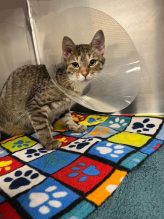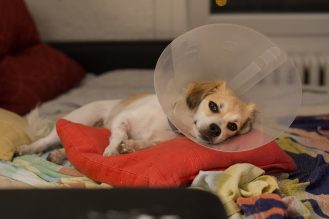Why Spaying or Neutering your Pet Matters in the Long Run
City services | February 17, 2023
Getting a new pet? In addition to getting a pet licence, don’t forget to spay or neuter them to give them a healthy start.
Spaying and neutering pets, like cats and dogs, stop them from reproducing or having unwanted offspring. They both involve surgical procedures that remove reproductive organs. While surgical procedures have risks, the overall benefits outweigh the risk.
Animal shelters, like the Mississauga Animal Shelter, are housing strays and unwanted pets like cats, rabbits and dogs. Spaying and neutering reduces unwanted litters and limits the number of pets entering shelters or rescue centres. There has been an overwhelming number of cats, dogs and rabbits to care for at the Mississauga Animal Shelter – many abandoned by their owners who couldn’t take care of unwanted litters. Last year, 293 cats, dogs and rabbits were spayed/neutered by the City’s partner vet clinics. Twenty-three of the cats spayed/neutered were part of the Trap-Neuter-Return-Management (TNRM) program. The TNRM program manages the feral cat population (unowned domestic outdoors cats that avoid human contact).
Spaying and neutering pets can also reduce behavioural issues associated with the mating instinct:
- reducing aggressive behaviours like biting and attacking
- lessening the need to mark territory
- stopping the need to roam, guard or spray
- decreasing excessive barking, yowling, meowing
- reducing mounting activity
- preventing your pet from giving birth to an unwanted litter
- stopping female animals from going into heat
- lessening mess to clean up as spaying pets stops them from having their period
In many cases, having your pet spayed and neutered can also lower their chances of reproductive health problems or illness (e.g. uterine infection, tumours, risk of ovarian, uterine, mammary, testicular cancer, pyometra and prostate issues). While spaying or neutering a pet may resolve certain behaviour concerns, it may not always cure them all.
For most pets, spaying or neutering can happen anytime; however, it’s best to have it done sooner than later – especially when pets are younger. The ideal age is usually around five months. This is especially important for cats, who can become pregnant at four months. Your vet can help you select the best time, which may depend on the type of pet, breed and weight.
After surgery, it is important to monitor a pet’s weight and adjust their diet appropriately to prevent weight gain. It’s also important to ensure your pet is comfortable after surgery and that the incision is healing correctly.
Several clinics in Mississauga offer affordable spay and neuter services. The cost of spaying or neutering a pet varies. If you have questions about spaying or neutering your pet, talk it over with your veterinarian.
If you want to licence your pet through Mississauga Animal Services, fees are generally lower when your pet has been spayed or neutered.
Interested in learning more about spaying and neutering? Visit mississauga.ca/services-and-programs/animals-and-pets/pet-owner-responsibilities/. For more information about licensing, adopting and fostering pets, pet care, animal emergencies and local wildlife, visit mississauga.ca/services-and-programs/animals-and-pets/ or contact Mississauga Animal Services at 905-896-5858.
Tags
Media contact
City of Mississauga Media Relations
media@mississauga.ca
905-615-3200, ext. 5232
TTY: 905-896-5151


